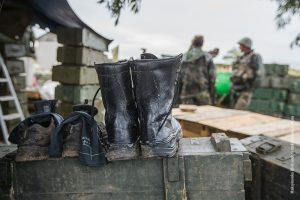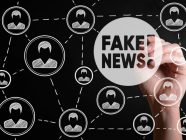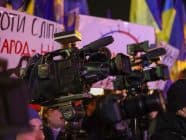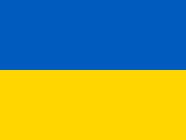
Ukrainian journalists say it is impossible to remain neutral and detached when covering the conflict in their country.
Ukrainian journalists find it hard to remain neutral and independent when covering the conflict in their country. Many are torn between feelings of patriotism and their role as detached observers, new research has found.
Of the 47 Ukrainian journalists, representing 42 different media outlets, interviewed for the study, most said they tried to adhere to ethical and journalistic standards when reporting the war in the Donbas region, eastern Ukraine, but added they did not want to ‘hurt’ the Ukrainian side through their reporting.
The research found that few Ukrainian newsrooms offer guidance or support to journalists on how to cover the conflict. There are no written rules or agreed ethical standards and professional judgments are usually left to the journalists themselves. Ukrainian reporters working in the conflict zone tend to rely on their ‘gut instinct’, rather than instructions, the study revealed.
The research: The Coverage of the Conflict in the East by the Ukrainian Media was conducted by Detector Media, a non-governmental organisation based in Kiev. Interviews were conducted in February and March 2016.
Patriotic vs neutral
Researchers found a variety of approaches to covering the conflict among the journalists they interviewed. They identified three clear attitudes: patriotic, neutral, and combined.
Those described as ‘patriotic’ for the study consciously focus on covering the Ukrainian perspective. They ignore “the other side” and are prepared to sacrifice professional standards for what they see as being the interests of state security. For example these journalists expressed a desire ‘not to play into the hands of Russian propaganda’.
‘Neutral’ journalists believe in unconditional adherence to professional standards. This approach particularly applies to Ukrainian media organisations that announce that they work in accordance to western standards, also to western media with offices in Ukraine, including BBC Ukraine, Deutsche Welle and Radio Free Europe/Radio Liberty.
The third type of professional approach, identified as ‘combined’, was the most prevalent among media professionals interviewed. These journalists declared an understanding of the importance of ethical standards, yet stated they often feel conflicted between adhering to these standards and not wanting to harm the Ukrainian cause by reporting anything that might damage their country.
Soldiers receive the largest share of the coverage
Members of the Armed Forces of Ukraine receive most coverage, especially from national television channels. Journalists said this is because their audiences are more interested in this aspect of the conflict. Dariya Orlova, the report’s lead researcher and author, believes this trend may also be because journalists get to know soldiers while reporting the conflict. As a consequence they often develop personal connections and then worry about their safety.
Journalists expressed similar emotions to activists who help the army (in Ukrainian discourse they are usually called ‘volunteers’), but cover them less frequently. Less press attention was paid to internally displaced people, or to the local Donbas population, on both ‘liberated’ and ‘occupied’ territories. Newsrooms believe these groups are less interesting to the audience. Journalists also claimed security issues hindered their coverage of these groups, as well as the lack of sources of information and material resources.
Is it possible to be objective?
Many journalists acknowledged they are unable to detach themselves from the conflict and admitted their coverage is accompanied by emotional tension, compassion and reflections on state security.
One journalist, from a national print magazine, said: “… we would love to be beyond the situation in Ukraine, but it is impossible. Why? Because… when you are personally persecuted by the PRD, and you have already been announced as a criminal just for your materials, it is hard to be beyond the situation. When your acquaintances have been killed or imprisoned, it is hard to be beyond the situation. When there is a military aggression against your country, it is also hard to be beyond the situation. After all, what does it mean to be beyond the situation? We can end up with an absurd, some neutral statements. Without admitting the obvious … neutrality is unachievable here. How can you, for instance, describe the annexation of the Crimea neutrally? We can write ‘the incorporation of the Crimea’ and ‘referendum’ without quotation marks, but then [we are reporting] the position of Russia.”
Another, from a national television channel said: “…this conflict is taking place just in our country; our people are dying; our state and our people are suffering. Herein, a journalist is not able to be beyond the situation.”
Although the study found professional standards are not adequately discussed within most newsrooms, all journalists interviewed recognised the importance of ethics when reporting armed conflict.
At the same time, most talked about standards as though they are a “matter of-course” that do not necessarily need to be discussed or explicitly defined.
Many media organisations have developed a vocabulary of conflict definitions, yet the approaches vary greatly from newsroom to newsroom. Some media try to use neutral language, while others rely on the official vocabulary of the Ukrainian government’s Anti-Terrorist Operation (ATO) headquarters. For instance, the ATO press centre calls the opposite side ‘Russian occupational troops’, (російсько-окупаційні війська), ‘invaders’ (окупанти) or terrorists (to denote separatists of the so-called Donetsk and Luhansk People’s Republics).
The study concludes that the majority of Ukrainian media deliberately avoid the reporting the perspective of “the other side” in their stories about the conflict. Yet they also distrust the official discourse of the Ukrainian government and military leaders.
Overall, it is clear journalists understand the importance of objectivity. However, they admit they are uncertain whether it is possible to be objective without harming the Ukrainian state.
Professional independence and experience
The vast majority of journalists consider themselves to be free of editorial interference when covering a conflict. At the same time, researchers detected several limitations media practitioners impose upon themselves: self-censorship, editorial and social pressure. A significant proportion of those interviewed confessed that sometimes they simply avoid topics which could cause potential harm for the Ukrainian side or could be taken up by Russian propaganda.
A minority admitted they felt an editorial expectation to cover the army in a positive way. Some confessed to being afraid of social criticism and accusations of “betrayal” or of taking an “anti-Ukrainian position”.
“While the level of institutionalisation of editorial practices in the Ukrainian media is rather low, a great role is played by personal factors: individual and professional experience of a journalist and his or her own views”, Dariya Orlova, the lead researcher explained. She added that many of the journalists covering the conflict are originally from the Donbas and the Crimea, and so find it even harder to be detached.
Dialogue?
The study concludes that the vast majority of journalists interviewed consider dialogue between Ukraine and the governments of self-proclaimed republics, Donetsk People’s Republic and Luhansk People’s Republic, to be important and necessary, but few appeared to understand how this could work in practice. According to the journalists, there is no promotion of dialogue in the media because there is no distinctly articulated state policy on the future of the occupied territories and the citizens of these territories. Thereafter, most of the journalists are not ready to take responsibility for promoting the idea of a dialogue, although they are prepared to report such a dialogue.
This article first appeared on EJO Ukraine
Pic Credit: Sasha Maksymenko Flickr/CC (https://creativecommons.org/licenses/by-nc/2.0/)
The research was implemented in partnership with OSCE Project Coordinator in Ukraine with the financial support of the Embassy of Great Britain in Ukraine.
Tags: conflict, Crimea, Donbas, Donetsk, ethics, Journalism, media, objectivity, OSCE, Research, Russia, standards, Ukraine, War Reporting













































